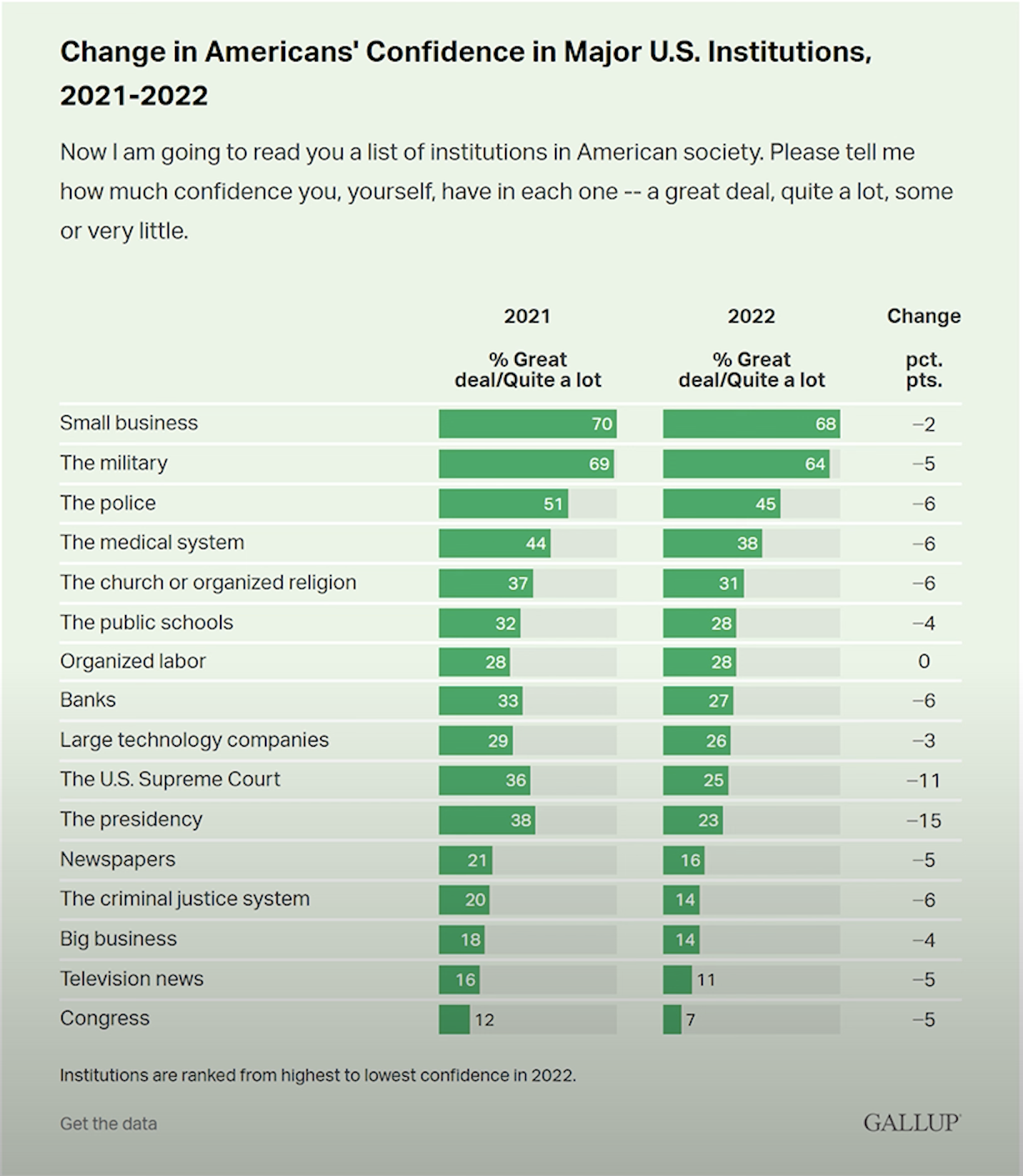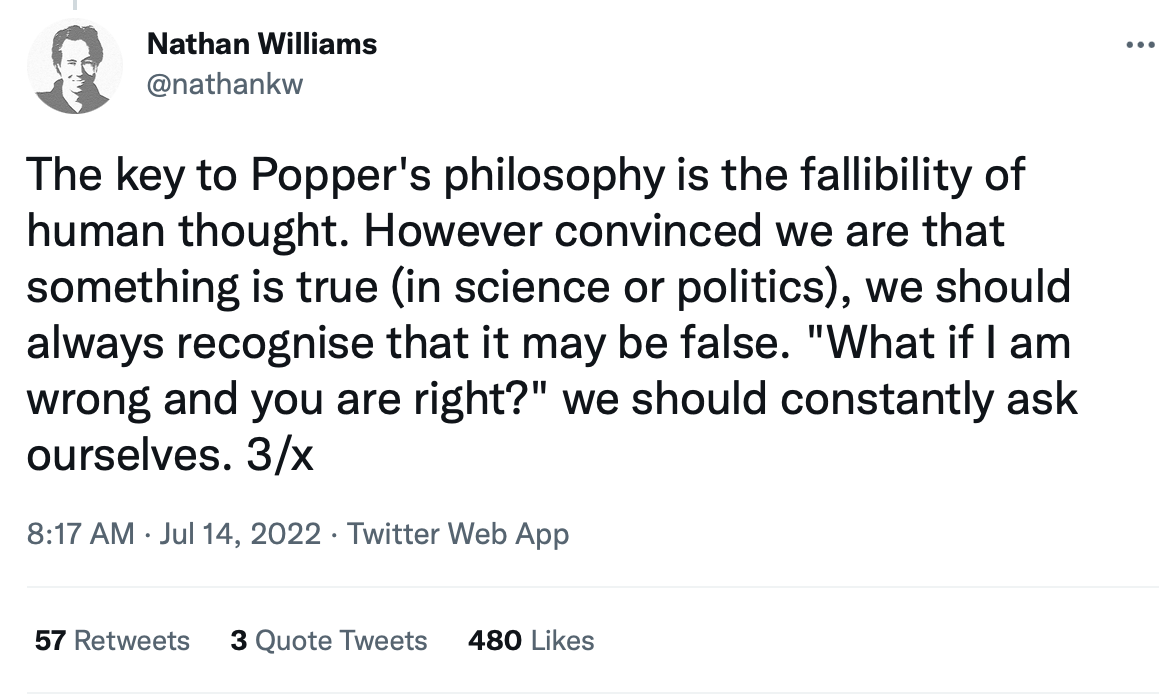America’s Institutions are crumbling. We can see it all around us, according to this recent Gallop poll:
Jonathan Haidt comments on one of the main causes of institutional decay: The failure of institutions to nurture and encourage free and vigorous speech resulting in the lack of viewpoint diversity:
America’s institutions were once strong, he says.
“By the mid to late 20th century, America had the best epistemic institutions in the world, epistemic meaning institutions that generate knowledge, like universities, research institutes, intelligence agencies.
“Social media comes in and makes us afraid of dissent. Because if you tell a joke, if you raise a question, if you even so much as tweet, a link to a study, an academic study, that questions an orthodoxy about race, or gender, you can be fired for that.
“When critics go silent, the institution gets stupid.”
He has co-founded an organisation called the Heterodox Academy, which aims to foster free institutional debate.
“We’re scientists and social scientists, and we know how hard it is to find the truth. When you have a bunch of people with PhDs and expertise in an area trying to study something, especially complex social policy, half the time we’re going to get it wrong, it’s really hard to find the truth.
“And if people are afraid to dissent, then you’re guaranteed to not find it, you’re going to be wrong about almost everything.”
He believes we are on a downward trajectory currently, but we may well bounce back.
“I’m reading a lot of cyclical theories of history. The ancient Greeks knew, and Muslim scholars in the 14th or 15th century, a variety of people in history have noticed that history goes in cycles of 80 to 100 years sort of four generations.
“Generally, you have a generation that builds and builds strong things and their kids kind of get a little lazy and soft and don’t take care of them. And then the grandkids really don’t know how to work them, and the things collapse, but the collapse causes hardship that creates a stronger generation, and then they build.
“So, there are cycles to history.”
What do we need to keep our institutions strong? We need to have excellent ideas, but the only way to have excellent ideas is to continuously test them, otherwise they get flabby and incoherent. John Stuart Mill was laser focused on the need to subject all of our ideas to the marketplace of ideas. When we have the courage to do this, we can see whether particular ideas have merit. If we don’t have viewpoint diversity, we will not know whether our ideas have merit. Karl Popper emphasized this same idea in the realm of science, especially its relation to Popper’s “Paradox of Tolerance.” Nathan Williams offers this summary of Popper’s thoughts in this tweet thread. Here are some highlights:
Williams’ thread continues . . .
The key to Popper’s philosophy is the fallibility of human thought. However convinced we are that something is true (in science or politics), we should always recognise that it may be false. “What if I am wrong and you are right?” we should constantly ask ourselves.
Popper’s answer to this problem is that, however certain you are, you should always subject your ideas to constant challenge: by experiment (in science) and through rational debate (in politics). This means that freedom of thought and speech is absolutely central to Popper.
But Popper, drawing on Plato, recognizes a paradox. If one side refuses to allow debate, suppresses any contrary view and answers any verbal challenge with violence – they may succeed in stopping all debate. This is then fatal as ideas can no longer be challenged
This is true even if (indeed particularly if), the side suppressing free speech believes it is on the moral side. So any side that is intolerant of dissent, that refuses to engage in that vital debate, should itself be treated with intolerance. This is the paradox.
For an example, Williams refers to the raging arguments regarding “gender ideology.”
So does this apply to the current debate around sex and gender. Perhaps. The question is not who is right – either side could be wrong. The question is does one side try to suppress discussion and open debate – such as Stonewall’s #nodebate policy?
Does one side threaten violence against those they disagree with? “Answer arguments by use of their fists” as Popper put it? If so, that is the side we shouldn’t tolerate. If you think Popper has something useful to say (and I think he does) then your duty is to challenge anyone (but particularly your own side) who tries to suppress the rational discussion of ideas. Because remember, however certain you are that you are on the right side, you may be wrong. And the only way you’ll know is through rational debate with those you disagree with.
I find all of the above important to the issue of our crumbling institutions. We need to be on the lookout not only for ideas we disagree with, but for those who seek to shut down debate. Those who stifle debate do this with many tactics, including ad hominem attacks, social shaming, but also threatening the jobs and careers of those who dare to question certain ideas. What we need are institutional safeguards, but many institutions are too far corrupted for that fix. For many institutions, it will require immense work to install such safeguards. And even where such safeguards do exist on paper, they won’t be enforced where the social-intellectual capital of an institution is corrupted.
As I will be discussing in coming weeks, we need courageous conversations. We need people who still have positions of prominence to speak up and to defend others who are doing this. We also need everyone in institutions to speak up, and this will often require courage and risk to their social standing and careers in this Age of Cancel Culture.
In Jonathan Haidt’s statement, above, he discusses the genius of America’s Founders. They anticipated cancel culture and installed safeguards to protect their new visionary form of government:
“There is this simplistic, naive view of democracy that most of us in America have, which is democracy is great. The founding fathers wanted us to have democracy, it’s the best system.
“No; democracy is a really difficult and a fairly bad system, Plato said it’s the second worst system because it always decays into tyranny.
“And so, the American founding fathers read a lot of the ancient Greeks, they knew this and they gave us a Republic with democratic features, you can call it a democratic republic.
“They were very wise about the nature of humans. James Madison, the architect of the Constitution, has lovely quotes, brilliant quotes about the human tendency toward faction, we’re more inclined to vex and oppress each other than to work together for the common good.”
The founding fathers put constitutional safeguards in place to “slow things down, to prevent people from getting carried away by their passions.”
“But of course, social media is just brilliant at making people outraged over nothing within 60 seconds.”
Originally a useful tool, social media is now inimical to democracy, he says, because it allows no place for considered debate.
“To have a deliberative democracy, there has to be some space for people to deliberate, to talk about the issues of the day. That doesn’t mean it’s going to be friendly or civil. It can have anger, while there can be anger, there should not be intimidation, there should not be threats of violence, people should not have to worry that they’re going to be fired or attacked physically for stating their opinion on an ordinary issue.”
The utopian vision of an interconnected and informed world has turned into a nightmare, Haidt says.



